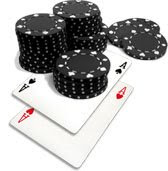There are numerous opinions about setting limits to your play in a cash game with interesting logic behind each one. Often I find that the logic that is applied to the decision of setting limits or not relates to how that particular player wants to play as opposed to how they should play. Here is what you should probably consider doing in regards to limits especially if you are a developing player.
I should clarify that limits for that sake of this discussion relates to putting a limit on your losses during a particular session. It does not relate to the limit game you are playing at. I will save that for another time.
There are many players, pros included, who will say that they don't put a limit on what they could lose for a particular session. Instead, they say they will continue playing as long as they feel they are playing their best game. To me, that type of thinking is inherently flawed. It is great that while you are playing you feel as though you are always playing your best game. That is essential. However, if while you are playing your best game you are tossing your whole roll away, it is probably a good time to call it a day.
There are people who believe that setting a loss limit on a given session limits the way you will play and doesn't give you the opportunity to fight back from the ebb and flow that can be characteristic of a poker sit. This has some truth to it. If you were to sit down and immediately go on a run of cold cards and losing hands that within the first little while you hit your loss limit for that sit and had to go, you might feel completely discouraged. You might start thinking that playing is a waste of time and that you are not giving yourself a chance. You would be wrong.
I have seen players go on monster slides where they have gotten killed for huge amounts of cash and stayed to play until they were tapped out. I've seen losing runs where players determined to get it back, sat hours for marathon sessions just to break even and leave feeling they had done good by themselves. I have seen players go up a little bit and then run losing streaks to the point of getting felted and rebuy multiple times in hopes of getting back to that place of being up a little that never comes. All of these things are unnecessary.
When you are playing poker you can not be caring about the money. If you are concerned about the money, you are losing before you sit down. That may sound contradictory to setting a loss limit but it really isn't. You should play your best possible game without caring about the money. When you do that, you have the best chance of coming out ahead. By setting a loss limit, you allow yourself the opportunity to come back and fight another day. Remember, playing like you don't care about the money is a strategy, your bankroll is still your life blood and you have to be respectful of it. Any given day of play is just one day, you will have an eternity of sits ahead of you where if you are playing your best, you will come out ahead.
You can't win every session. You only need to win most sessions and not loose more than you win. By setting a limit on your losses you protect your bankroll and actually make it easier to play like the money doesn't matter. For example, if you put a loss limit of 4% of your bankroll on any given session, you will never feel fearful about playing hard, smart and aggressive poker because in the event that you do hit your limit, it poses very little risk to your overall roll. That is how the two strategies work well together. Alternatively, if you have no limit, you leave your roll at risk and could hit that slippery slope of playing to get even in a game where that never comes.
Play smart and play solid with a cap on your loss and you won't be afraid to stop and say, there is always tomorrow. With a solid bankroll strategy in relation to your losses, you are sure to have a regular increase in your bankroll over time.
Monday, October 20, 2008
Subscribe to:
Post Comments (Atom)





No comments:
Post a Comment